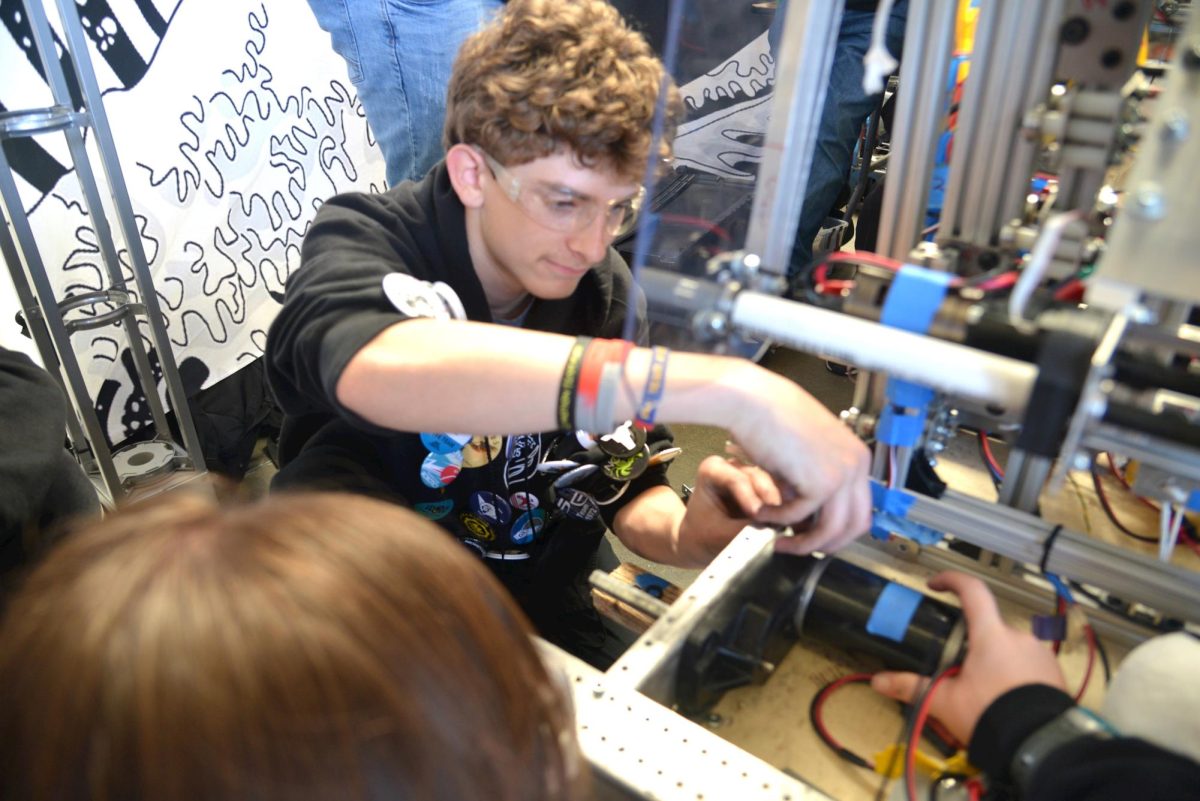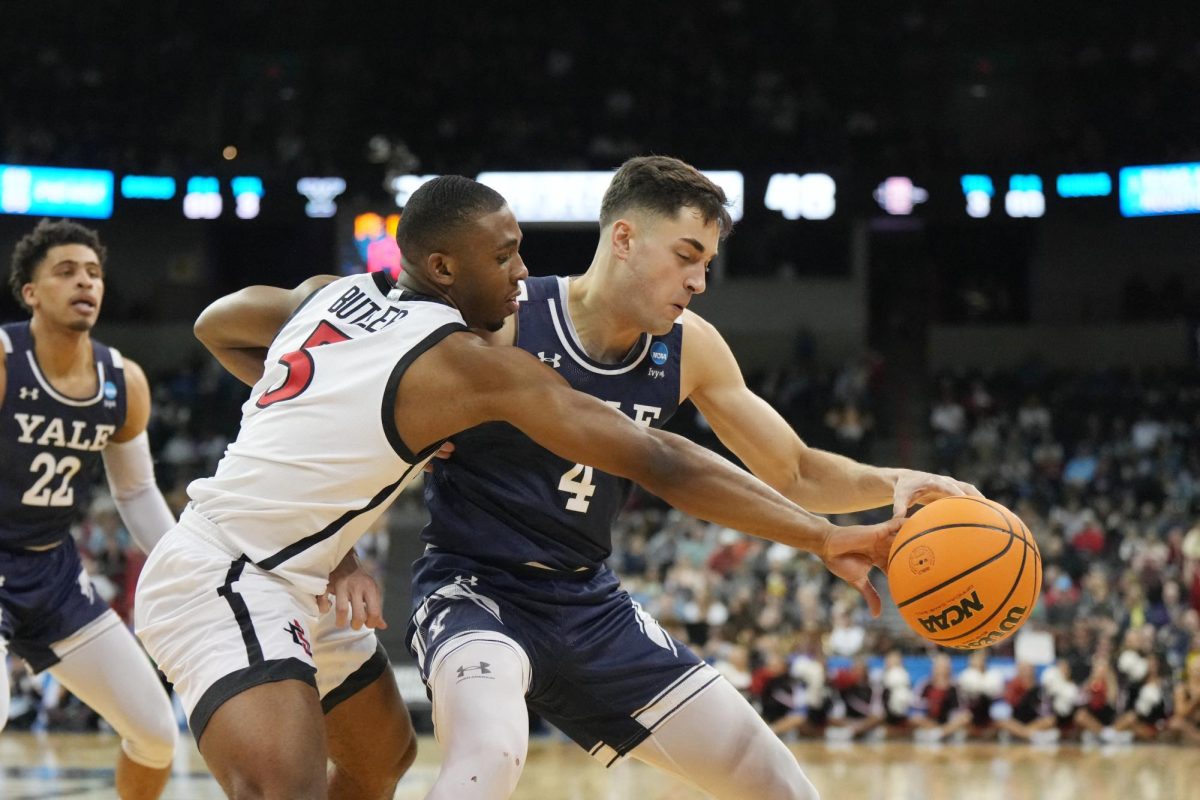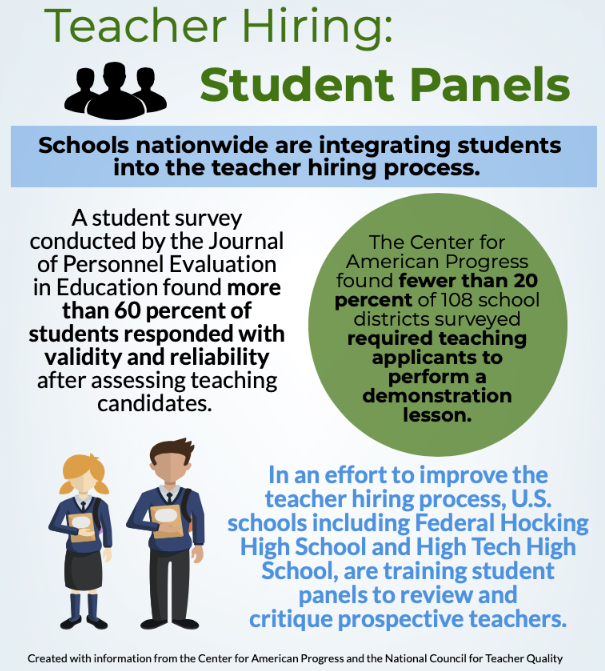Holistic hiring
Infographic by Savannah Dupper
Though disputed, student involvement in teacher hiring is supported by studies conducted as early as 1924.
January 23, 2019
For many high school students, nothing hinders their educational experience more than an unqualified, unenthused teacher.
“Before I transferred to [Cathedral Catholic High School], I had a terrible English teacher who didn’t teach anything,” CCHS student Delaney Fritz ‘20 said. “My class all got low grades on our essays, and she wouldn’t teach us how to write better. That experience negatively affected my education because I wasted an entire year not learning anything.”
Teacher quality, a main concern for most schools, recently has inspired educational administrators to refine and to improve their institution’s faculty hiring process through pupil panels.
Pupil panels, bodies composed of several students in various grade levels, are utilized in interviews with prospective teachers in order to provide students the opportunity to share opinions and advice about potential candidates with school officials.
Although somewhat controversial, offering students a voice in teacher hiring is a common sense practice schools nationwide should employ for the betterment of education and of classroom environments.
While many schools vary in their hiring processes, the quality of teacher hiring is deteriorating in many school districts.
The Center for American Progress recently found fewer than 20 percent of 108 school districts surveyed required applicants to perform a demonstration lesson, either to students or adults, while a third of the districts did not ensure that candidates met with a school’s principal.
“It’s important that administrators stop limiting the hiring process and begin advocating for a more robust process where teachers are hired based on multiple criteria that have been shown to correlate with teacher effectiveness,” National Council on Teacher Quality manager of strategic initiatives Miss Nicole Gerber said.
In fact, despite popular belief that students are too unreliable to include in the hiring process, a study from the Journal of Personnel Evaluation in Education concluded out of 9,765 students surveyed about a teacher candidate, more than 60 percent responded with validity and reasoning.
Moreover, students are able to discern candidate qualities adults are unable to perceive.
“I’ve noticed that when interviewing teachers, students often see things or think of things that the adults do not,” said Mr. Cliff Bonner, principal of Federal Hocking High School, an institution that uses pupil panels. “It’s always great to get [the students’] thoughts and perspectives.
“I feel including [students] in the hiring process has strengthened our school community and our faculty members.”
In addition to helping schools pick out the best teachers, student involvement in teacher hiring teaches students democratic decision-making and fosters the development of leadership qualities.
“We made a conscious decision years ago to be as democratic as possible,” Mr. Bonner said. “Our students and staff wrote a school constitution and the right to have a student interview committee was included. It is amazing how seriously the students take the process.”
However, the practice of pupil panels is not without controversy and still needs improvement in some cases.
Many people feel it is demeaning to subject adults to the judgement of children. But if administrators build a professional, well-structured hiring environment with student committees, their school communities benefit in the long-term from a more holistic hiring process.
Moreover, students are customers and shareholders of the school they attend.
If a school should be run like a business as many educators claim, an extensive and comprehensive hiring process should be inputted. No successful business would hire an employee based on one experience at a hiring fair without exposure to a board of directors or to a CEO.
While administrators often claim they make decisions for the good of the students, the fact that students are not included in district-wide and school-wide decision-making essentially excludes them from expressing what they themselves perceive as for the good of the students. Most board members could easily make room for student representatives.
A school is only as good as its teaching staff, and student hiring panels could significantly improve teacher quality.
“Because they ask such pointed questions, I always joke that the students are the hardest job interview, not the teacher committee or my interview,” Dr. Bonner said. “It’s great that students are able to buy in with our [FHHS] choice of new teachers.”






















































